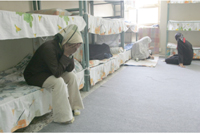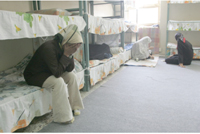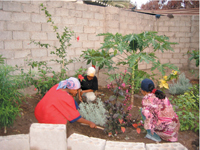
Human Rights activist Afra’a Al-Hariri:”Former women prisoners in Yemen cannot reintegrate into society.” [Archives:2008/1137/Last Page]
March 13 2008
 |
 |
& Abdulwahid Abdullah
Former women prisoners in Yemen face many obstacles preventing them from reintegrating into society, such as absence of identification documents, violence and the government ignoring their issues, according to one human rights activist, speaking during an exclusive interview with the Yemen Times.
Afra'a Al-Hariri, a lawyer and founder of the Relief Center for Former Women Prisoners and Victims of Violence, narrated how the center's residents suffer such problems.
“The main difficulty the center faces with security agencies began when our center demanded issuing identity cards for our residents,” explained Al-Hariri, whose countenance displayed a mixture of both anger and pain.
“Our executive administration followed up the matter with related security agencies via an official memo from the current governor of Aden. At first, several officers came to collect information about each resident, but then this process stopped for no reason. I demanded it commence again, so some other officers came, but to no avail.”
She continued, “After this, the center conducted a media campaign and a workshop to mark its first anniversary. During that workshop, the campaign launched with taking photos of the residents demanding their identity cards.
“The security agencies began negotiating the matter again. The residents were investigated and questioned frequently in order to obtain information to issue the cards, but with no benefit.
“I followed up the matter with the social researcher at the Civil Status Authority and the Civil Record, but they didn't take any decisive action. Instead, they accused me of publishing the residents' photos everywhere, including on the internet. Look at how people deal with women! I said, 'Excuse me, sir, but these women aren't prisoners anymore and the nation must admit that before the entire society,'” she recalled.
Al-Hariri didn't give up, publishing an April 2007 article in local newspapers comprised of a letter to Yemen's interior minister concerning this matter, but so far, she has received no response from him.
She warns about the negative consequences of ignoring the importance of issuing the women's identity cards.
“These women and girls don't exist because they aren't officially recorded, so if any of them chooses to return to their families, they could get rid of her easily by killing her under what's known as an honor crime,' However, in this situation, no case would even be raised due to the unavailability of the victim's identity, so no reporting would be carried out, not even by the neighbors or the tribe's sheikh,” Al-Hariri explained.
She added, “I dare the security agencies to release any information or numerical data on honor crimes committed against female Yemeni ex-prisoners due to the absence of basic information about these women's backgrounds. They don't even have birth certificates.”
The legal procedures for investigations by police stations and courts stipulate verifying an individual's identity. “However, in reality, this is not done, so I wonder how a verdict is ever given without verifying the identity, as the law states. This would mean that all legal procedures are invalid! What's even stranger is that some citizens have election cards when they're still under the legal age,” Al-Hariri pointed out, affirming that this problem not only involves former women prisoners, but many other Yemeni citizens, particularly Yemeni women.
“I conducted scientific research for my graduation from the Women's Research and Training Center at Aden University's Women's Studies and Development. I received upsetting results revealing public indifference regarding identity cards for men and women. Some groups don't even get identity cards. Men consider having it more important than women do because of their view that women have lower social status.
“Moreover, I discovered that voting cards are considered more important because the state, represented by security and military agencies, tribal sheikhs, election committees related to the ruling party and some opposition parties, are encouraging citizens to get such cards – but not identity cards!” she marveled.
Not the only problem
Lack of such documentation isn't the only obstacle facing female ex-prisoners, including the center's residents. According to Al-Hariri, these women are subjected to various types of violence; for example, they are rejected by their families, who refuse to take them back after their release, and in many cases, they are murdered.
For these reasons, they find themselves without financial support. “In most cases, they fall victims to violence, ending up on the streets and earning their livelihood through begging or prostitution.” Al-Hariri affirmed, adding that most of these women also suffer psychological problems due to the physical violence and the “unfair treatment they experienced in prison.”
What the center offers
Al-Hariri opened the relief center based on her research results regarding the situations of women prisoners at the Al-Mansoora Central Prison in 1999. “I did it because, being a human rights activist, I have an interest in the issues of vulnerable women and children.”
After the issue surfaced regarding newly freed women prisoners being rejected by their families and/or refusing to return home for fear of being killed, Al-Hariri received help from the director of the first care project while supporting the Yemeni Women's Union (YWU)-Aden for the first time.
“The center was established with the aim of providing accommodation and assistance to former women prisoners, empowering them by participating in normal life and fighting violence against women,” Al-Hariri explained, noting that the center also takes in those women subjected to domestic violence.
She continued, “Former women prisoners and others who are subjected to domestic violence come through the security agencies, public prosecution and the Criminal Investigation Authority. If they come via other agency, we ask them to report there, after which they are sent to us. They also come from the legal protection project of the YWU-Taiz and its other branches under the framework of a project supported by Oxfam, Britain/Yemen. While their ages range between 13 and 45, most are between ages 16 and 23.”
Having received 51 women since its establishment in 2005, the center provides accommodation, food and drink, clothing and medication. Residents attend reading and writing classes at the center using the government's anti-literacy curriculum.
The relief center offers three levels, the first of which is first and second grade of primary education. The second level is third and fourth grades of primary education, while the third and final level is fifth and sixth grade of primary education. Those who pass the third level sit for a test to join seventh grade, which is the first grade in secondary school.
The center also offers psychological and social counseling, “which are considered the most important and determine the length of stay at the center,” Al-Hariri said, adding that such counseling differs depending on the case.
“Working with violence cases requires time, which differs from one woman to another. The initial work begins with treating her as a worthy human being and this is hard because peoples' personalities vary. First, we let the woman adapt to others, including our administration and staff. That takes a week in some cases and then we move to the next phase, which is offering services and training.”
Rehabilitation includes providing education (legal, health, environmental and religious practices). Training includes learning to make various traditional handcrafts and those types of training that the center can't provide are done at other associations. Such training includes computers, coiffeur, silver making, leather tanning, etc.
Al-Hariri added, “We also visit families and other places and go on trips, in addition to providing legal and judicial support for the women to follow up their cases.”
Center at risk
The first of its kind in Yemen, the women's relief center receives monthly operating finances from the German Technical Cooperation, or GTZ. However, it faces a critical financial problem at the end of this year.
“We have a deal with GTZ to support us for three years and it's about to end. GTZ thought the Yemeni government would be interested in the matter and support the center later; however, the Yemeni government is hostile toward every agency independent of the ruling party, everything related to human rights and conducting justice and everything that's pure and clean and has nothing to do with corruption.” Al-Hariri criticized.
She added, “Although our center has been successful in the Middle East and North Africa and considered an outstanding experience, the Yemeni authority has provided zero donations.
To the contrary, it has stood against any donations given by local traders and neither recognized nor encouraged the center's success,” said Al-Hariri, who received the U.S. State Department's International Courage Certificate in June 2007 as one of the world's 10 bravest women that year.
Al-Hariri concluded her remarks with harsh comments about the Yemeni government, as well as international human rights organizations.
“International donor organizations and diplomatic agencies should be transparent and credible when it comes to human rights issues, especially those involving women and children. They become advocates of the government, centered on finances and confining their relations to those the government praises based on lame excuses, such as the absence of safety in Aden,” she said, explaining that finances are given to organizations in Sana'a, with special exceptions for those in Taiz.
“Such organizations should reorganize their agenda because they claim to defend the rights of women and children, but do the opposite by violating human rights with help from the government. They know full well that the law doesn't have the upper hand, but rather the tribes and the military. Poverty and corruption continue increasing while a huge portion of our resources is in their hands. So, stop toying with human rights, especially those of women and children,” Al-Hariri concluded.
——
[archive-e:1137-v:18-y:2008-d:2008-03-13-p:lastpage]


